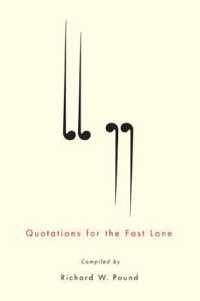- ホーム
- > 洋書
- > 英文書
- > Politics / International Relations
Full Description
This work is a scholarly analysis of the evolution of the modern American peace movement. It contains the writings of some of the foremost scholars in the field. Among the contributors are the late Pulitzer Prize-winning historian, Merle Curti, as well as prize-winners Charles Chatfield and Lawrence S. Wittner. This volume is arranged chronologically, and offers fresh perspectives on how the peace movement shed its pre-World War I elitism while, at the same time, transforming itself from one of opposing war to one of proclaiming the need for social, political, and economic justice. The tragedies of World War I represent a major turning point in the movement's history. The essays selected detail the changes which took place within the movement to the advent of the 21st century. Included in this anthology are scholarly discussions about the influence of liberal pacifism, the evolution from nonviolent passive nonresistance to direct action, and efforts to build a safe world through crusades against racism, gender inequality, and environmental awareness.The work also contains an historiographical essay by the editor detailing the large body of literature that now exists on peace history in American society. The purpose of this work is to highlight how the study of peace history has captured the attention of those studying various aspects of American military, diplomatic, and social history. Indeed, peace movement activism in the last half of the twentieth century may very well represent the greatest social movement of our times.
Contents
Foreword by Charles Chatfield; Preface; Introduction; 1. Retrospect; 2. An Interpretation of the American Peace Movement, 1898-1914; 3. World War I and the Liberal pacifist in the United States. 4. The making of the modern Peace Movement; 5. The Peace Movement in the Thirties; 6. Direct Action, 1957-1963; 7. From Civil Rights to the Second Wave of the Feminist Movement, 1960-1975; 8. The Clamshell Alliance: Consensus and Utopian; Democracy; Conclusion; Appendices; Selected Readings; Index.








